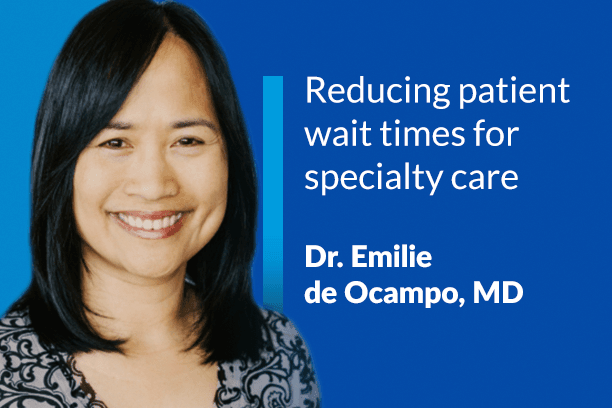Reduce Wait Times to See a Specialist

By Emilie de Ocampo, MD, Pediatrics at Golden Valley Health Centers
Featured in Tech Healthcare News
OCTOBER 29, 2019 – In the United States, more than a third of patients are referred to a specialist each year and specialist visits constitute more than half of outpatient visits. With an ever-growing U.S. population, there is a significant increase in specialist referrals year over year. Many patients are encountering long, and lengthening, wait times to see a specialist and/or must travel long distances to obtain the specialty care they need.
Like many community health clinics across the nation serving a vulnerable safety-net population, our patients face significant challenges in accessing the care they need, especially when it involves a specialty referral. The majority of patients must wait four to five months before they can be seen by a specialist—if they are seen at all. A large portion of our patients ultimately don’t end up ever seeing their referred specialist.
With such long wait times between being referred and their scheduled appointment, patients forget about their appointment, they lose interest in seeking specialty care, or don’t show up to their appointment due to transportation issues. I’ve witnessed the transportation challenges that our patients face—many rely on public transportation or rides from friends and do not have good options for out-of-town travel, where many specialists reside.
Access is especially difficult for Medi-Cal and Medicare patients who usually suffer the most when seeking covered specialty care. These patient populations often wait months for an appointment and, once they do hear back from a specialist clinic, oftentimes find their insurance isn’t accepted or the specialist has relocated. Many times these patients are lost to the referral loop; one study found less than 40 percent of U.S. patients complete their specialist visit as referred.
In my experience, eConsults are decreasing patient waiting times to see a specialist for our patients and improve their access to timely specialty care. eConsults allow our PCPs to gain insights directly from specialists on clinical questions, diagnostics and treatment plan recommendations for patient cases that may not require a face-to-face visit with a specialist. When appropriate, specialists recommend—within 24 hours—a care plan that we can initiate and maintain within our clinic, in a setting where patients are already comfortable, thereby avoiding lengthy wait times to get the care they need.
While eConsults are effective across a broad range of specialties, I have found endocrinology eConsults particularly useful. Often, these cases involve thyroid issues where a patient’s hypothyroidism leads to abnormal lab results. It’s often unnecessary to see a specialist face-to-face; the patient can be effectively managed with the support of bloodwork along with a specialist’s recommendation. Wait times for endocrinology visits often span months, so being able to retain a greater percentage of patients within the primary care setting and initiate a timely treatment plan greatly improves outcomes and patient satisfaction.
eConsults have created a communication bridge between primary care and specialists that we never used to have, and they have empowered us to handle more complex cases by leveraging timely specialist insight. As primary care providers, it’s our responsibility to do what we can to positively impact the health of our communities. eConsults have become an effective tool to improve our patients’ access to quality care.
